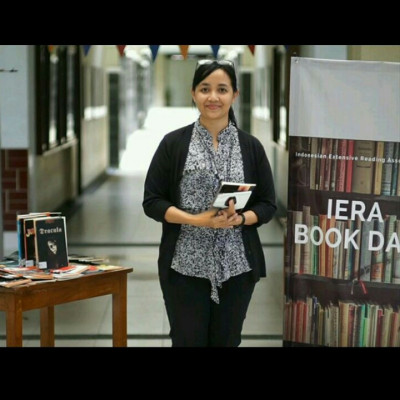Sessions / Location Name: Sunday
Virtual Location
Virtual: You cannot enter virtually via this page. Click on the titles of individual presentations or go to the Live Page
Establishing an Extensive Reading Program in a Chinese as a Foreign Language Context: Reading attitudes, language abilities, and ER activities #3242
Extensive reading (ER) has been widely practiced in teaching English as a foreign or second language contexts. However, reports on how ER has been practiced in Chinese as a foreign or second language contexts are not commonly seen. This study reports how an ER program was established in a liberal arts college in the U.S.A, and how ER affected the L2 Chinese readers’ reading attitudes. The study also examined L2 Chinese learners’ perceptions of language abilities improved through ER, and their enjoyment of ER activities. Data were collected over thirteen weeks through pre-and post- reading attitude surveys, weekly ER activities, and the end of the semester reflections. The findings suggested ER significantly improved L2 Chinese readers’ confidence in reading Chinese and devotion to learning Chinese. ER was perceived to improve reading fluency, reading comprehension, vocabulary, grammar, character recognition, character recognition, writing, speaking, and listening skills. The study also revealed that students enjoyed ER activities because they solidified their comprehension and provided opportunities to interact with co-participants.
Library Management and Reading Spaces #3320
Join the breakout room for a discussion on Library Management and Reading Spaces.
Profiling reluctant readers #3202
Although the benefits of extensive reading in L2 English are well documented, many university students still elect to do little or even no reading. This may be the case even at institutions where English is emphasized or where ER comprises a substantial part of a course grade. Students at one large university program in Japan took part in a survey aiming to better understand the behaviors and attitudes of students toward ER. Out of 248 students, roughly 35% of students identified as reluctant (achieving only about half or less of ER word count assignments). Overall attitudes toward the ER program were surveyed, and the answers of reluctant and compliant readers were compared in areas such as time management, future-self image, cost-benefit attitudes, reading and system experience, etc. The results can help better address the concerns of reluctant readers and help future cohorts achieve better results.
Encouraging Students’ Extensive Reading using Interactive Virtual Library: A Story from MTsN 1 Pandeglang, Indonesia #3198
Studies indicate that extensive reading has given considerable benefits for language learners (Nation, 1997; Yamashita, 2013; Suk, 2017; Wang & Ho, 2019). However, the major challenge to do extensive reading in an EFL setting is book availability (Renandya et al., 2020). In addition to that, students in the digital age nowadays are strongly dependent on activity-related technology, causing reading to lose its attraction. In the effort of proposing an alternative solution to this challenge, extensive reading needs to be simultaneously implemented with technology. One encouraging way is using Interactive Virtual Library (IVL), which is a contextually-designed free reading resource created by a teacher to support students’ ER practice interactively. In this presentation, we would like to share an Indonesian teacher’s best practice in encouraging students’ ER using IVL. Specifically, we would like to describe how the IVL is created, how it looks like, and how it is implemented in the classrooms. In addition, we will also discuss some opportunities that the IVL offers, including how it can be adopted and/ or adapted in other EFL contexts, and how it solves the issue of limited book availability at schools. Furthermore, we will describe some potential challenges from creating and implementing the IVL, and what we can reflect in order to better implement it in the future.
Extensive Reading Podcasting: Community Sharing and Empowering #3199
Community sharing and empowering on extensive reading can be supported and done through various means. Starting from early 2020, free online workshops and webinars on extensive reading have flourished to help the community to stay updated, enriched, and connected due to COVID-19. Indonesian Extensive Reading Association (IERA) took this opportunity to create an online platform for ER community in the form of a podcast. A podcast is an open source that provides varied series of discussions on certain topics. The podcast that we are going to share is “satERdate with” podcast which focuses on extensive reading and literacy. “satERdate with” invited ER experts, practitioners, and enthusiasts to share theories, insights, and their best practices. This presentation emphasizes the possibility of using a podcast as an online community sharing and empowering on ER. In addition, we will also highlight how the podcast can be used as a free authentic extensive reading online resource for academic purposes.
Graded Reader Writing Competition: Motivating Students to Write AND Read #3238
Permission to Record
Extensive reading and creative writing are two activities that can be both enjoyable and motivating for students. With the objective of combining the two activities, plus to add a competitive element, a graded reader writing competition was held among students at a junior/senior high school in Tokyo, Japan. In this semester-long project, students, under the guidance of their teacher, wrote and illustrated their own graded readers. Despite multiple challenges, the result was successful. Twelve student writers completed novels which were then made available on the Xreading website so they could be read and rated by hundreds of students around the world as well as a panel of volunteer judges. The presenter will discuss the process that was used, share some samples, and explain how the project will be expanded in the future.
English as a Foreign Language Reading Survey 2022 #3228
This presentation will outline the goals of the Global Foreign Language Reading Survey 2022 (GFLRS 2022). GFLRS will survey teachers from all over the world to examine their perceptions of how foreign language reading should be taught in kindergarten, formal schooling, university and in adult education. GFLRS will illuminate the teachers' perceptions of the place of extensive reading in the foreign language curriculum and how it is practiced by those teachers who are doing ER and will find out why many teachers and institutions are reluctant to do ER, the barriers they face before adoption and what we can do to persuade them to adopt ER. Attendees will first hear a brief summary of the project and will be encouraged to highlight areas in the survey that might need to be modified for certain regions to account for local conditions. Finally, participants can sign up to be part of the survey either as subjects or recruiters who will find subjects. All non-personally or institutionally identifying data will be made available to the public.









